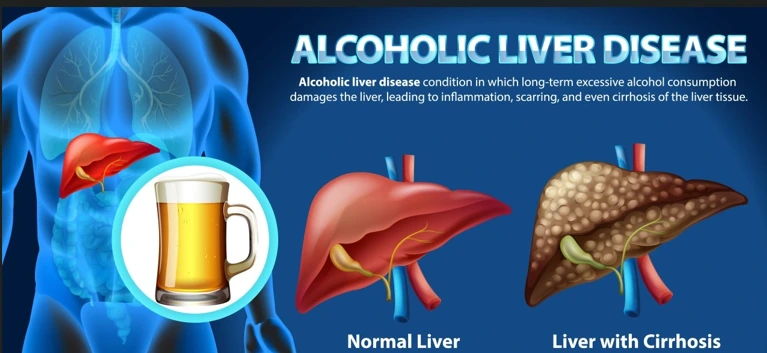Health
Alcohol’s Impact on Liver Health: Understanding the Consequences

The rising concerns over alcohol consumption and its effects on liver health have prompted health organizations to issue warnings about the consequences of excessive drinking. Each time an individual consumes alcohol, the liver undertakes the task of breaking it down. While it is designed to handle small quantities, continuous overindulgence can lead to severe repercussions.
Understanding Liver Function and Alcohol’s Role
The liver functions as the body’s detoxification system. It processes nutrients and filters toxins, including alcohol. With each drink, the liver works diligently to metabolize alcohol into less harmful substances. This process is efficient under normal circumstances, but the liver is not equipped to deal with high volumes of alcohol over extended periods. As a result, liver cells can sustain damage, leading to a cascade of health issues.
When the liver is overwhelmed, fat begins to accumulate within its cells. This buildup is often asymptomatic initially, but it indicates that the organ is under stress. Continued alcohol intake exacerbates the situation, leading to inflammation and swelling of the liver. The organ starts losing its ability to perform essential functions, such as detoxifying blood and managing nutrients.
Progression to Serious Liver Damage
As damage progresses, the liver attempts to heal itself, resulting in the formation of scar tissue, a condition known as cirrhosis. This scarring transforms the liver’s structure, making it rigid and less functional. By the time symptoms such as fatigue, swelling, or jaundice appear, significant damage may have already occurred. If left unaddressed, these conditions can result in severe liver failure, which may necessitate a transplant for survival.
Despite these alarming effects, there is hope. The liver is remarkably resilient. If individuals reduce or eliminate alcohol consumption, the liver often has the capacity to recover. Early detection and intervention can significantly improve outcomes.
Health experts emphasize the importance of treating the liver with care. Reducing alcohol intake can mitigate potential damage and allow the liver to restore itself. As discussions about alcohol consumption continue to evolve, public awareness of its impact on liver health is crucial for prevention and long-term wellness.
In summary, while alcohol may seem harmless in moderation, its cumulative effects can lead to dire health consequences. Understanding the risks associated with excessive drinking is essential for safeguarding liver health and overall well-being.
-

 World5 months ago
World5 months agoSBI Announces QIP Floor Price at ₹811.05 Per Share
-

 Lifestyle5 months ago
Lifestyle5 months agoCept Unveils ₹3.1 Crore Urban Mobility Plan for Sustainable Growth
-

 Science4 months ago
Science4 months agoNew Blood Group Discovered in South Indian Woman at Rotary Centre
-

 World5 months ago
World5 months agoTorrential Rains Cause Flash Flooding in New York and New Jersey
-

 Top Stories5 months ago
Top Stories5 months agoKonkani Cultural Organisation to Host Pearl Jubilee in Abu Dhabi
-

 Sports4 months ago
Sports4 months agoBroad Advocates for Bowling Change Ahead of Final Test Against India
-

 Science5 months ago
Science5 months agoNothing Headphone 1 Review: A Bold Contender in Audio Design
-

 Top Stories5 months ago
Top Stories5 months agoAir India Crash Investigation Highlights Boeing Fuel Switch Concerns
-

 Business5 months ago
Business5 months agoIndian Stock Market Rebounds: Sensex and Nifty Rise After Four-Day Decline
-

 Sports4 months ago
Sports4 months agoCristian Totti Retires at 19: Pressure of Fame Takes Toll
-

 Politics5 months ago
Politics5 months agoAbandoned Doberman Finds New Home After Journey to Prague
-

 Top Stories5 months ago
Top Stories5 months agoPatna Bank Manager Abhishek Varun Found Dead in Well









